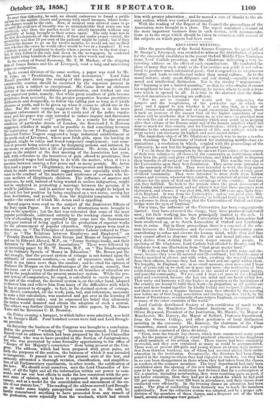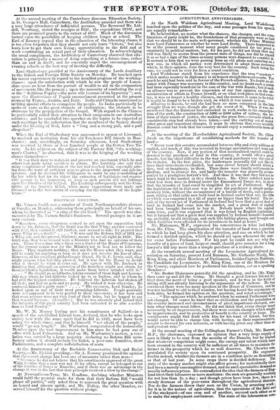EDUCATION MEETINGS.
After the proceedings of the Social Science Congress, the great hall of St. George's, Liverpool, was crowded to witness the distribution of prizes for the successful candidates in the recent Oxford Middle Class Examina- tions, Lord Carlisle presiding, and Mr. Gladstone delivering a very in- teresting address on the effect of such examinations. He combated the ideas of many that such study as the Universities can guide is not calcu- lated to produce much substantial good ; that it engenders an ungenerous rivalry, and leads to intellectual rather than moral culture. As to the moral culture, study needs diligence and self denial,—equally a test of moral and intellectual distinction. Nor is the rivalry " ungenerous," for " learning is not a limited quantity," so that he who obtains it causes his neighbour to lose it ; on the contrary, he incites others to seek a trea- sure which is opened to all. It is true in the abstract that the disin- terested incentives to learning are sufficient. " But we are to consider the wants and the exigencies, the dangers and the temptations, of the particular age in which we live ; and I appeal to you whether it is not true that, in a time of great commercial enterprise and of rapid commercial development, there is such an increase of the danger that all the higher aspirations of our nature will be overborne that it becomes us, as wise men—as practical men —to seek the aid of every instrumentality which may assist us in keeping alive that culture of the human mind and of the human intellect which has done so much for this country and for Christendom ; which so greatly con- tributes to the adornment and enjoyment of life, and without which no great society can discharge its highest and most sacred duties."
The immediate object of Mr. Gladstone's speech was to move a resolu- tion thanking the University of Oxford for instituting middle-class ex- aminations ; a resolution in which, coupled with the proceedings of the University, he saw but the beginning of greater things. " I see in them the resumption by the ancient Universities of the country of their true relation to all classes of the community as institutions which have been the pride and glory of Christendom, and which ought to dispense their benefits to all ranks of our fellow-citizens. This was the true aim of the Universities upon their first foundation. They never were intended to be the monopoly of the rich. They were intended to work the deep mines of capacity and of character which exist throughout the whole of every great civilized community. They were intended to draw forth from hidden corners and recesses, wherever they existed, the materials of genius and ex- cellence for the glory of God and the advantage of the country. And that aim they fulfilled. •Go back to the periods when the great movements of the human mind commenced, and see where it was that those processes were elaborated, and whence it was that 400, 500, 600, 700 years ago, light flow- ed in England. It was from the Universities; and as one great poet, Mil- ton, has called Athens the ' Eye of Greece,' so well and truly may it be said, in reference to their early history that the Universities of Oxford and Cam- bridge were the eyes of England."
For a time, the influence of the Universities has been comparatively limited : they have educated the clergy, they have produced cultivated nien ; but their working has been principally limited to the rich. It would have mattered little to the Universities if South Lancashire had been swallowed up, or to South Lancashire if Oxford and Cambridge were in ruins. But in these proceedings there is a renewal of the rela- tion between the Universities and the country ; the Universities again contributing to refine and elevate the human mind, while they feel that they cannot afford to dispense with the aid and moral influence which they derive from striking their roots deeper among the people. In speaking of Mr. Gladstone, Lord Carlisle had alluded to Homer, and Mr. Gladstone took one illustration from "that great master bard."
" He tells us that the army of the Trojans marched with noise and cla- mour, because they were ill-assorted and ill-combined ; but that the army of Greeks marched in silence and with maler, awaiting the word of command from their officers, because they had one heart and one spirit within them. We happily, in England, see, in no small measure, even now—and I hope that as years roll on we shall see it more and more—the realization of that noble feature of the Greek army which is the model of every great, happy, and peaceful community. We see—and I hope yet more to see—England quiet and contented, because she has one mind and one heart within her. That unity and harmony will rise higher in proportion as the institutions of the country arc bound to fulfil their work—in proportion as all parties are more and more bound together by kindly feeling and reciprocal advantage ; and there never was a happier instance than that afforded by the meeting now before me of that happy association and binding together which, by the favour of Providence, so eminently characterizes England, as compared with so many of the other countries of the world."
Lord Carlisle distributed Society of Arta certificates of merit to to students in the Manchester Mechanics' Institute on Monday. Mr. Oliver Heywood, President of the Institution, Mr. Mackie, the Mayor of Mtinchester, Mr. Harvey, the Mayor of Salford, Professor Greenwood, from the Owens College, and other gentlemen of local distinction assisting in the ceremony. Mr. Rumney, the chairman of the Class Committee, stated some particulars respecting the educational depart- ments, which consisted of three divisions.
"First were the female day classes, which were commenced many years ago, for the purpose of giving a sound practical education to the daughters of adult members of the artisan class. These classes had been eminently successful, and they now contained as many as could be accommodated. There were at present 260 girls and young women receiving daily instruc- tion from thirteen teachers, ten of whom had received almost their entire education in the institution. Occasionally, the directors had been disap- pointed in the strangers whom they had engaged as teachers, but they had m no case been disappointed in those whom they had taken from the classes as teachers of the younger members. The boys' department had only been established since the opening of the new building. A person who sent his sons to be taught at the institution had declared that for a subscription of 17s. a quarter, including membership, they were receiving quite as good, if not better education, than they had got at a school for which he bad paid 121. per annum. There were 220 boys in attendance, and their classes were conducted very efficiently. In the evening classes an alteration had been made. The plan of conducting them formerly was to teach the members individually. Now the collective system was adopted, and by a proper sub- division of the members of those classes, and a frequent use of the black board, several advantages were gsined."
At the annual meeting of the Canterbury diocesan Education Society, in St. George's Hall, Canterbury, the Archbishop presided and there was a very large attendance of influential persons. The Reverend Mr. Lid- dell, Secretary, stated the receipts at 8321., the expenditure 10191., and there are promised grants to the extent of 400/. Much of the discussion turned upon the possibility of keeping children longer at school. The Earl of Romney argued that in the education of the labouring classes it is too often forgotten that they should not only learn "letters," but also learn how to get their own living; apprenticeship in the field and at work constituting an actual part of their education. In acknowledging the usual compliment, the Archbishop of Canterbury observed that edu- cation is principally a means of doing something at a future time, rather than an end in itself; and he especially urged the encouragement of evening schools as the best way of meeting the difficulty.
Lord Shaftesbury presided at the Anniversary of the Leeds Auxiliary to the British and Foreign Bible Society on Monday. He touched upon his recent experiences in regard to the manifest progress of the working- classes ; upon the satisfaction with which he saw the people of Lanca- shire spare an hour from the pursuit of wealth to aid in the cooperation of movements like the present ; upon the necessity of combating the real or the " fictitious Popery—the more vile because of its hypocrisy "; and, upon the illustrations of Popish encroachment presented at the present moment by France, Austria, and Italy. India and China he mentioned as inviting special efforts to evangelize the people. In India particularly he spoke of caste as the great obstacle of civilisation ; the obstacle to be overcome by the propagation of the Gospel. With regard to the Chinese he particularly called their attention to their emigrants in our Australian colonies ; and he concluded two speeches on the topics to be expected at such meetings by the exhortation that the members of the Society should under the blessing of God, have a "long and a strong pull, and a pull altogether !"
When the Earl of Shaftesbury was announced to appear at Liverpool, he received an invitation from his old Ten-hours Bill friends in Man- chester; and, accordingly, on Saturday afternoon, Lord Shaftesbury was received by three or four hundred people at the Cotton Tree Ta- vern. In his address on the subject of the Factory Bill, "the working- man's Charter," he observed, that it was in the keeping of the working classes themselves- " It was their duty to maintain and preserve an enactment which he and others had made many sacrifices to obtain. His Lordship also said that many complaints of violations of the law had reached him, especially aris- ing from the want of sufficient powers given to the inspectors and sub-in- spectors; and he declared his willingness to assist in any remodelling of the law which had for its object the extension of legitimate and reason- able powers to the inspectors, so long as such powers did not infringe upon the liberties of the subject. His Lordship subsequently met the Com- mittee at the Queen's Hotel, when many suggestions were made and discussed as to the best means of carrying out the intentions of the Legis- lature."



























 Previous page
Previous page